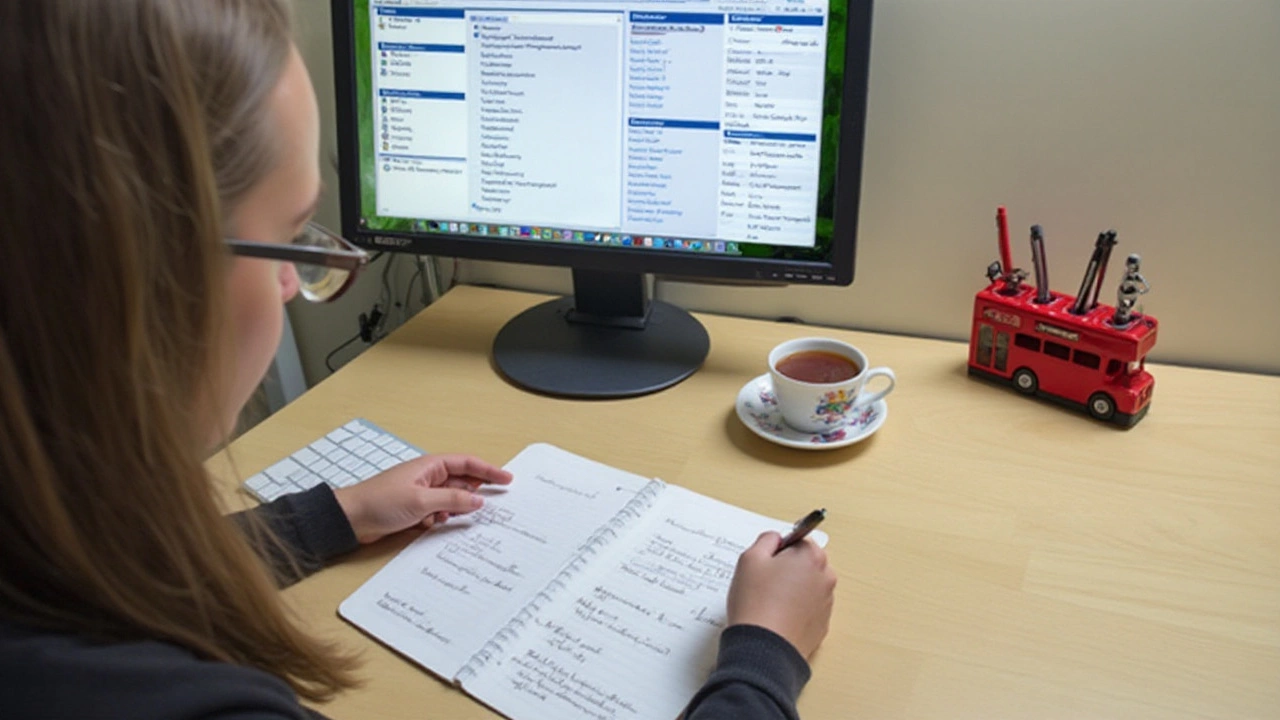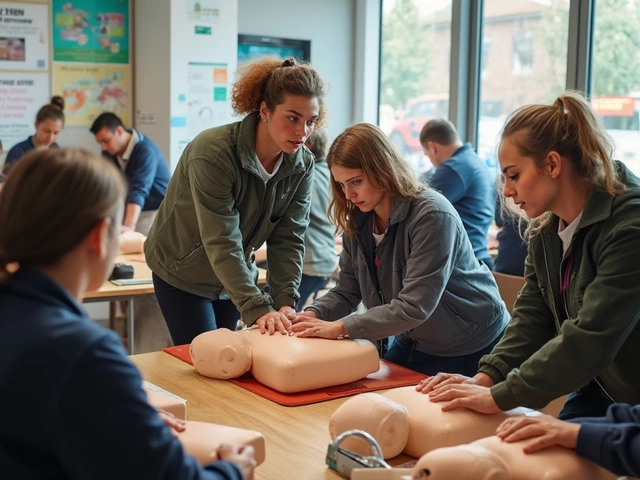Embarking on the journey towards an NVQ qualification can be both exciting and a bit daunting. You might be wondering exactly what it takes to obtain one of these respected qualifications. Fortunately, the process becomes clearer once you grasp the essentials.
NVQs, or National Vocational Qualifications, focus on practical skills and competencies, tailoring education to real-world applications. Whether you're at the start of your career path or looking to improve your current skill set, an NVQ provides a strong foundation for growth.
This guide will walk you through everything from understanding the fundamental standards to gathering the necessary documentation, developing crucial skills, and excelling in your assessments. Let’s dive into what you need to make your NVQ journey a success.
- Understanding NVQ Standards
- Gathering the Right Documentation
- Developing Essential Skills
- The Assessment Process
- Tips for Success
Understanding NVQ Standards
The NVQ, a widely recognized qualification in the UK, stands out due to its focus on real-world applications. It’s not just about theoretical knowledge but centers on proving competence in work-based environments, reflecting the demands of various industries. This ensures that candidates emerge not only with a certificate but with tangible, practical skills applicable to their chosen field. Understanding these standards starts with recognizing that each NVQ level builds upon the previous one, catering to novices and experienced professionals alike. The goal is always to demonstrate, through your work and assessments, that you’ve achieved the required level of expertise.
NVQs are structured around national occupational standards, which are descriptions of the skills, knowledge, and understanding needed to perform a particular job. These standards are carefully developed by sector bodies and qualification authorities to align with the needs of employers and industries. This means undertaking an NVQ involves a balance between learning new skills and reinforcing existing ones through practical experience, thereby enhancing job performance and readiness for new challenges. To get started on your NVQ journey, it is crucial to identify the level and sector that align with your career goals.
There are many NVQ levels to choose from, ranging from Level 1, which demonstrates basic work-related tasks, up to Level 5, where the expectation is for complex management capabilities or intricate work functions. Each level requires a different dataset of competencies and evidence. For instance, while Level 2 might involve showcasing general work activities, Level 4 might demand specialized knowledge or supervisory skills. It is this layering of qualifications that makes NVQs so versatile, welcoming individuals regardless of their prior experience or educational background.
"NVQs serve as a significant benchmark for vocational competence and innovation in the UK's learning and professional development landscape,” says Dr. Susan Simkins, a noted education policy analyst. “They empower individuals to learn at their own pace while ensuring they meet industry standards, which is invaluable for personal and career growth."
What is particularly appealing about NVQs is their adaptability. Unlike traditional educational models that often rely heavily on exams, NVQs let you demonstrate competence through practical assignments, observation, and sometimes interviews. This practical approach reduces the pressure associated with traditional tests, allowing candidates to focus on honing their skills in real workplace scenarios. This helps cultivate a deeper understanding of the job, which naturally translates to better performance and confidence in professional settings.
Choosing the right NVQ involves considering factors like your career ambitions, current work environment, and the skills you wish to enhance. It’s also wise to consult your employer or a training advisor to find an NVQ that complements your workplace and professional aspirations. Once you commit, you’ll engage in a learning journey where you collect evidence of your competence, which might include writing detailed reports, compiling portfolios, or engaging in performance appraisals.
Gathering the Right Documentation
Before you set off on your journey to achieve an NVQ, it's vital to gather the right documentation. This step is often overlooked but stands as a critical part of the process. Documentation acts as the backbone of your application; it can either streamline your path to success or create unnecessary roadblocks if not done properly. Understanding what paperwork is required and having it organized will save you time and stress down the line.
First and foremost, it’s essential to have proof of identity. Usually, this involves a passport or a driver’s license. These documents affirm your eligibility and ensure you're legally permitted to undertake the qualification in your country. Accompanied by proof of residency, such as a utility bill or a rental agreement, they provide a comprehensive view of your legal status.
Your academic history also plays a crucial role here. Collect certificates from previous education to support your NVQ pathway. While NVQs focus on practical skills, some courses have prerequisites that require you to demonstrate a basic level of academic achievement. Some learners might need fewer credentials, but having relevant certificates handy is a good practice.
If you are employed, a letter from your employer can be advantageous. This letter should state your role, responsibilities, and consent for you to undertake the qualification. It not only shows your current experience but also highlights your commitment to professional development. Employers often welcome this alignment, as an employee’s advancement can significantly benefit the organization.
Vocational training relies on practical evidence. Building a portfolio showcasing your skills and previous work can enhance your application. Portfolios offer tangible proof of your competencies and provide a snapshot of your vocational journey. This part of documentation requires careful collection and presentation of relevant materials, such as project summaries, examples of work, or even client acknowledgments, depending on your field.
A skills assessment may be necessary for certain NVQ levels. This involves providing proof of any previous training or informal learning that aligns with the NVQ standards. Generally, courses will offer guidance on what specifically to include, but starting with employment history and written testimony of specific skill exposures is often beneficial. Aligning your skills with the NVQ standards not only fortifies your application but also gives you a clearer picture of where you stand and what gaps may need addressing.
For overseas applicants, or if your credentials come from another country, you may need to convert or authenticate your documents. The UK, for example, has specific standards for foreign qualifications, and doing your due diligence here can sidestep delays. Be sure to check with the qualification provider for advice on recognized equivalent qualifications and translation requirements if needed.
"Proper preparation and documentation become the cornerstone of any successful NVQ journey," says Jill Waters from the National Careers Service. "Assembling your documents in advance and ensuring they are up to standard will make the whole process much smoother."
In some cases, specific sectors might have additional documentation needs. For instance, pursuing an NVQ in health and social care could require clearance or certification from accredited health bodies. It’s vital to engage with the assessment body early in the process to uncover any special sector-based requirements you may not initially consider.
In short, make sure that all your paperwork aligns with the NVQ provider's guidelines. Missing or incorrect paperwork could delay or even jeopardize your enrollment. Always double-check to ensure everything is current and submitted by the deadlines given. Remember, an organized approach to gathering and presenting your documentation not only facilitates a smoother application but also sets a positive tone with assessors and course facilitators.

Developing Essential Skills
Developing essential skills for your NVQ qualification is about more than just acquiring knowledge—it's about mastering the competencies that are critical for your vocational field. These skills might vary depending on the specific NVQ level or the trade you're entering, but one core aspect remains constant: the ability to apply practical knowledge in real-world settings. Having a solid plan for skill development can make all the difference in achieving your NVQ goals.
A critical first step is identifying the skills most relevant to your desired qualification. This may involve technical abilities, such as appliance repair for an electrician, or soft skills like communication and teamwork for a customer service role. Begin by reviewing the standards set out by your chosen NVQ. These standards are often mapped out clearly in your course materials or by your training provider, offering a roadmap to what you'll need to know.
Once you've identified the skills, practice is paramount. Engage in hands-on learning experiences wherever possible; real-life practice helps internalize these skills far better than theoretical study alone. Many who have succeeded in gaining their NVQ recommend immersing yourself in relevant environments, such as workshops, labs, or other controlled settings, where you can hone your skills under the guidance of seasoned professionals.
Some practical tips include participating in workshops or study groups. Pair up with peers to tackle projects or challenges that simulate actual work conditions. This experience allows you to troubleshoot in a supportive setting, enhancing your problem-solving skills. Educational resources like online tutorials or industry-specific forums can also offer valuable insights and knowledge from seasoned practitioners.
To effectively track and assess your progress, maintaining a journal can be incredibly beneficial. Document your learning outcomes, challenges encountered, and techniques developed. This kind of reflective practice not only helps consolidate your learning but also provides a valuable resource to revisit as you prepare for your assessments. Keeping a record of your growth can also be inspiring and motivating as you look back on how far you've come.
"Skills are the currency of the future," notes John Smyth, a leading education consultant. This resonates particularly with NVQs, where every skill mastered is a testament to your competency in your chosen field.
Many learners find it useful to seek feedback regularly. Whether from tutors, peers, or workplace mentors, constructive feedback is essential to shaping your journey toward the NVQ qualification. This input can offer fresh perspectives and help identify blind spots you might have missed. Embrace this feedback as an opportunity to refine and polish your skills continually.
Finally, remember that persistence is key. Developing essential skills requires dedication and adaptability. Celebrate small victories along the way, as each step forward brings you closer to your NVQ certification. By focusing on tangible skill development and leveraging the resources available to you, you'll be well-equipped to meet the challenges of your NVQ assessments and pave a successful path in your vocational career.
The Assessment Process
The journey of attaining an NVQ involves a comprehensive assessment process that uncovers and validates your capabilities. This evaluation is designed to measure your competency in real-world scenarios aligned with the industry standards. It's less about traditional exams and more about proving skills in practical settings. You are expected to demonstrate your expertise through various tasks and activities you perform in your work environment. As you progress, assessors will need to observe your working practices over time. Their job is to ensure you meet all the assessment criteria outlined for your specific level of certification. It’s an embracing path that lets you shine through the skills and knowledge you've gained on the job.
To facilitate this assessment, evidence plays a vital role. Evidence can take on multiple forms, including documents you produce, witness testimonies, video recordings, and reflective accounts of the tasks you complete. The key is to ensure your evidence is varied, relevant, and up-to-date. Your evidence portfolio becomes a reflection of your abilities and achievements. You often have an
"open-book” type", where you're consistently adding proof of your competencies as required. Assessors may sometimes request supplementary information or clarification about certain aspects of your work to gain a full understanding of your skill set.
Another crucial component of the assessment process is feedback, which empowers you to track your progression and identify areas for further improvement. You'll get constructive feedback from your assessor that helps you understand where you stand and what more you could do. This feedback is instrumental in driving continuous improvement and ensuring that you accommodate to new challenges adeptly. Open communication with your assessor is equally essential—they are there not just to evaluate but also to facilitate your learning journey. It's a collaborative process aimed at supporting you all the way to your qualification.
The NVQ system's flexibility allows you to work at your own pace—another compelling element that appeals to busy professionals. The assessment process isn't rushed; it's progressive, paced according to your specific circumstances and commitments. Whether you are attending workshops, studying independently, or engaging with mentors, the timeframe is adaptable. This gives you the opportunity to blend your educational pursuits seamlessly with your professional obligations. Such an approach not only enhances learning but also ensures that knowledge and skills are being reinforced through practical application.
It's interesting to note that, according to the Association of Employment and Learning Providers, nearly 80% of those who complete an NVQ feel their work skills have notably increased. This statistic highlights the substantial value NVQs impart to employees, reinforcing their abilities and boosting their confidence in carrying out their roles. Credentials and qualifications gained through vocational training are known to open doors to new opportunities and career advancements.
In summary, the assessment process for an NVQ qualification is about demonstrating true competency in your chosen field. It's not just a test of knowledge but a practical validation of what you can do. You become part of a system that prioritizes skill and expertise, which can significantly elevate your career prospects. As you gather evidence, receive feedback, and showcase your abilities, remember that each step is aligning you closer to recognized achievement. Embrace the process with enthusiasm, and let your work speak volumes about your professional dedication and proficiency.

Tips for Success
Success in the realm of NVQ depends largely on how well you prepare and approach your assessments. One key tip is to stay organized. As you progress through your NVQ levels, the amount of evidence and documentation you need can seem overwhelming. Try to keep an organized portfolio. Digitize your materials if possible, and categorize them by the specific unit or skill they pertain to. This not only helps during assessments but also allows you to see areas you’ve mastered and those that might need extra attention. Taking methodical notes during your practical training sessions can save you much time and effort later.
Dedicating regular time slots in your weekly schedule for NVQ studies can significantly boost your confidence and competence. Incorporating NVQ-related tasks into your daily routine ensures that preparation becomes second nature. Discuss with your mentor or supervisor about incorporating practical projects that align with your NVQ objectives into your current job role. Real-world applications of the skills you're developing not only reinforce your understanding but also show your assessor your commitment. These projects provide tangible evidence of your learning and can make a big difference during evaluations.
Seek Feedback and Support
Never underestimate the value of feedback. Regularly seek constructive criticism from peers, supervisors, or even fellow course-takers. They can offer fresh perspectives and insights that might not be immediately visible to you. If possible, join study groups or forums with other NVQ candidates. These networks can be a source of support, shared resources, and motivation. Engaging with others on the same journey often enlightens you about different approaches and tips that can be applied to your learning process. Also, tapping into such groups can make the sometimes solitary journey of self-improvement a more shared and enjoyable experience.
"Learning is not attained by chance; it must be sought for with ardor and diligence." — Abigail Adams
Keep your eyes open for workshops, seminars, and other learning opportunities outside of your regular NVQ training. These can enhance your knowledge base, refresh existing skills, or present new techniques and tools. Many professional bodies offer free or low-cost sessions that are highly relevant to NVQ curricula. Staying informed about such opportunities provides the dual benefit of learning something new while also introducing you to potential mentors or colleagues.
Pacing Yourself
Balancing NVQ commitments with personal and professional responsibilities can be a tough act. It's essential to set realistic goals and timelines for yourself. Instead of aiming for perfection, aim for consistent progress. Break down your goals into manageable chunks. Use a goal-setting tool or a simple planner to keep track of your objectives and deadlines. Recognize achievements along the way; celebrating small victories can provide the motivation needed to push through challenging phases.
Finally, always be proactive about seeking help when needed. Whether it’s from your course provider, mentors, or online resources, remember that you're not alone in your quest for an NVQ qualification. Utilizing the right resources not only makes the journey smoother but also enriches your learning experience.





Write a comment